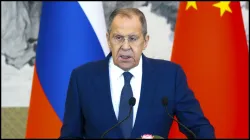Russia's foreign minister calls Taiwan 'integral part of China', Taipei slams 'false claims'
Russian Foreign Minister Sergey Lavrov called Taiwan an "integral part of China" and an "internal affair of the People's Republic of China". Taiwan responded angrily, saying the Russia-China collusion does not contribute to stability across the Taiwan Strait.

Taipei: Russia stoked controversy after Foreign Minister Sergey Lavrov called Taiwan an "integral part of China", prompting an angry response from the self-governing island nation, slamming the remarks and saying that China has "never governed Taiwan". Tensions between China and Taiwan are continuously high, as Beijing claims the island country as part of its own territory and has vowed to reclaim it by force if necessary.
Lavrov made the comments on Tuesday during a press briefing when he referred to Taiwan as an "integral part of China" and an "internal affair of the People's Republic of China". He also said Russia was united with Beijing in rejecting any so-called external interference, referring to the United States, which has rejected China's claims and continues to support Taiwan despite having no diplomatic relations.
Taiwan slams "false claims" by Russia
In an angry denouncement of these "false claims", Taiwan's Ministry of Foreign Affairs (MOFA) said that neither Taiwan nor China is subordinate to the other and the Chinese Communist Party. "The ROC (Taiwan) is a modern democratic country that actively defends the democratic system and respects human rights and the rule of law. No distorted narrative disparaging Taiwan's sovereign status can change the internationally recognised cross-strait status quo," it said in a statement.
"The collusion between Russia and China does nothing to contribute to stability across the Taiwan Strait and the region. In fact, their authoritarian convergence causes serious damage to international peace, stability, and the rules-based international order," the Ministry further said, while committing to strengthening cooperation with like-minded countries to resist China's rhetorical and military communication and curb "authoritarian expansionism".
Meanwhile, Taiwan's Foreign Ministry expressed gratitude towards US President Joe Biden and Japanese Prime Minister Fumio Kishida for their reaffirmation of stability in the Taiwan Strait following the first-ever trilateral summit in Washington, DC on Thursday.
China-Taiwan tensions
China has never renounced the use of force to bring democratically-governed Taiwan under its control and has ramped up military and political pressure to assert its sovereignty claims. Chinese President Xi Jinping recently met former Taiwan President Ma Ying-jeou and told him that outside inference could not stop the "family reunion" between the two sides of the Taiwan Strait and that there are no issues that cannot be discussed.
Ma, president from 2008 to 2016, last year became the first former Taiwanese leader to visit China, and is now on his second trip to the country, at a time of simmering military tension across the strait. Ma had been widely expected to meet Xi this time around, having first met Xi in Singapore in late 2015 for a landmark summit shortly before the current Taiwan president, Tsai Ing-wen, won the election.
On the other hand, Ma told Xi that tensions have caused unease for many Taiwanese. "If there is a war between the two sides, it will be unbearable for the Chinese people. Chinese on both sides of the strait absolutely have enough wisdom to handle all disputes peacefully and avoid heading into conflict," he said, using a term that refers to people who are ethnically Chinese rather than their nationality.
Responding to the meeting, Taiwan's China-policy-making Mainland Affairs Council said it deeply regretted that Ma did not publicly convey Taiwan's people's insistence on defending the sovereignty and democratic system of the Republic of China, which remains Taiwan's formal name. It further said Beijing should stop intimidating Taiwan and resolve its differences with Taipei through respectful and rational dialogue.
Earlier this month, Xi Jinping told his US counterpart, Joe Biden, over a phone call that the Taiwan issue is the "first red line" that must not be crossed by Washington and warned that Beijing will "not sit on its hands" if "Taiwan independence" forces step up their "separatist activities" with the help of external elements. He urged the US to act in accordance “with President Biden’s commitment of not supporting ‘Taiwan independence.
(with inputs from agencies)
ALSO READ | China sanctions two US companies for supporting weapons sales to Taiwan amid tensions